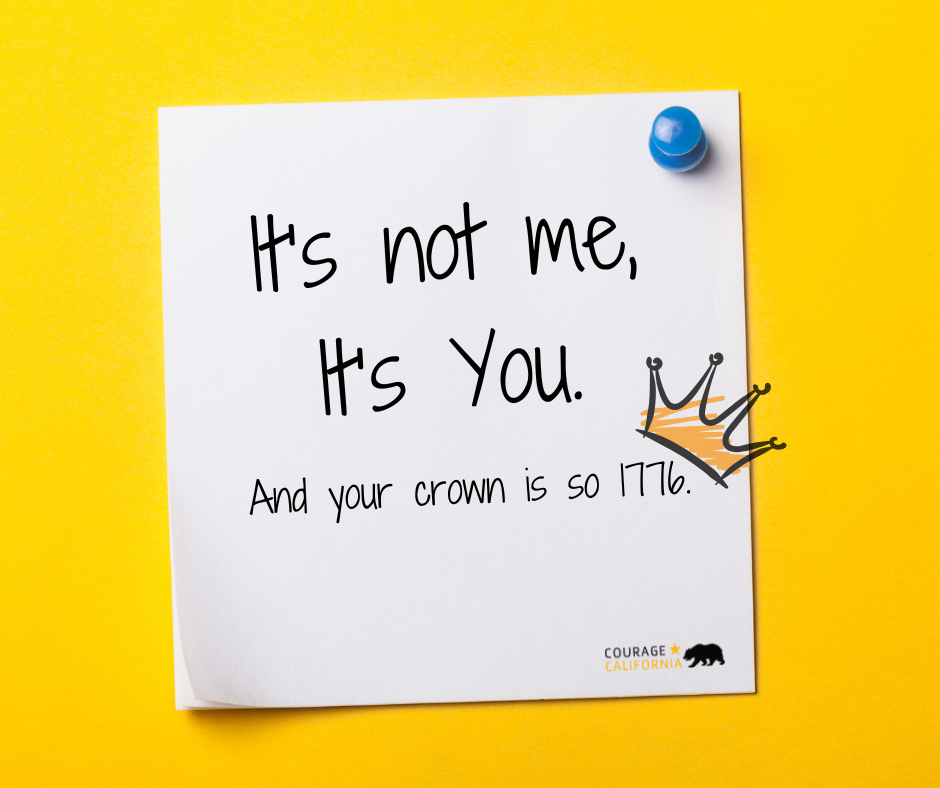I’m at a loss for how to celebrate Independence Day this year. Every day, I’m finding it harder and harder to watch our constitutional republic inch further and further away from the spirit it was meant to represent.
As a uterus-carrying descendant of immigrants and native to these lands, the best way I can think to patriotically commemorate the anniversary of America’s infamous break-up letter with the British Empire is by continuing the tradition set by our forefathers: Airing grievances, criticising the government, and protesting.
Radical rebels unite!
The Declaration of Independence is the document that declared the American colonies’ independence from the British Empire. It was drafted by the “Committee of Five” — John Adams, Benjamin Franklin, Thomas Jefferson, Robert Livingston, and Roger Sherman–and signed by 56 delegates to the Second Continental Congress on July 4, 1776.
The Committee of Five cannot be considered patriotic, as the United States of America did not yet exist in 1776. Instead, they were progressive (for their time) thought-leaders and rebels who protested and fought a violent war against the British government. The Declaration solidified the colonists’ commitment to fight for independence, which wasn’t officially recognized until the British surrendered in 1783.
Why? “Taxation without representation,” my dear compatriots. The colonies, while under British rule, were being unfairly treated and taxed by the British Parliament without elected representatives to voice and vote for their interests in governance.
A tactic still commonly used today, including by the U.S.A.: Puerto Rico, Guam, American Samoa, the U.S. Virgin Islands, and the Northern Mariana Islands. You can take the man out of the empire, but you can’t take the empire out of the man.
Crimes of tyranny committed by the Crown
The Declaration outlined twenty-seven (27) grievances against King George III and the British monarch, providing evidence of their right to rebellion against tyranny. Some of these “crimes” committed by the crown might sound eerily familiar today.
One grievance accused the King of having “plundered our seas, ravaged our Coasts, burnt our towns, and destroyed the lives of our people.” Essentially, the at-war British Crown was taxing, exploiting, and destroying the lands, resources, and people of the American colonies.
Another grievance accused the King of “cutting off our trade with all parts of the World.” Parliament sought to control trade by requiring goods to be shipped by British ships and limiting trade to only England, and eventually barring all American trade.
A third grievance could be taken straight from recent newspapers: The King was “depriving us in many cases, of the benefits of Trial by Jury” and “transporting us beyond Seas to be tried for pretended offences.” In other words, people were being deported without due process, exactly what is happening right now.
The Committee of Five used this list of grievances to justify America’s independence from the British monarch, arguing that when a government becomes tyrannical and infringes upon equality and the rights listed in the preamble, the people have the right to revolt and establish a new government.
“We hold these truths to be self-evident, that all men are created equal, that they are endowed by their Creator with certain unalienable Rights, that among these are Life, Liberty and the pursuit of Happiness.”
Preamble, The Declaration of Independence
Fun fact: the Declaration and Resolves of the First Continental Congress originally stated that the inhabitants of the English colonies in North America … are entitled to life, liberty, and property. (Any guess as to why it was later changed to happiness?)
It’s not me, it’s you. Or maybe we’re too much alike.
The Declaration of Independence is the break-up letter that ended British tyranny, but subsequently created an all-American version. With the American colonies’ newfound independence came new laws of governance, outlined in the U.S. Constitution in 1788.
America’s growing pains were just getting started, and California was a distant pipe dream.
It turned out governing people isn’t as easy as it sounds. Who is a person? Who is a free person? Who is an American? Oddly enough, these are questions that needed to be answered and were brought to the forefront by the Seneca Falls Declaration in 1848 and Frederick Douglass’s “What to the Slave Is the Fourth of July?” in 1852 – and countless more movements and court cases that sought to expand and shrink rights and protections during the United States of America’s 250 year existence.
July 4, 2025
This 4th of July, many Americans will joyously celebrate American independence – but others are boycotting Independence Day by participating in “Free America Weekend,” organized by Women’s March, or refusing to accept a vision of freedom that doesn’t protect everyone, including Latina soldiers who have been killed, silenced, and ignored. And others may find that there are fewer places to celebrate due to the cancellation of 4th of July events to protect communities from racial profiling and unjust ICE and bounty hunter abductions.
These celebrations and boycotts will occur under the guise that Independence Day is a celebration of American patriotism, but quite the contrary. The Declaration of Independence might have birthed the battle that led to the colonies’ ultimate freedoms, but history tells us that what we’re actually celebrating is a coalition of rebels coming together to break up with their tyrannical government.
However you choose to commemorate the 4th of July, let the Declaration of Independence serve as a reminder and source of inspiration for our ongoing fight for freedom against tyranny.

